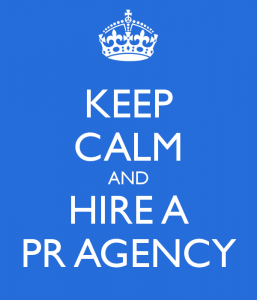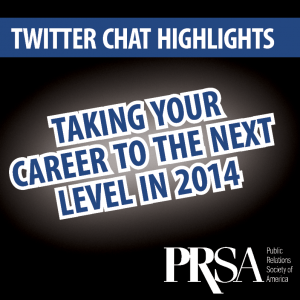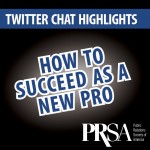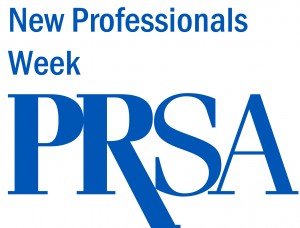 After graduating college, I was torn between searching for jobs in-house or at an agency. I knew I wanted to work in corporate communications, but the advice I received from PR professionals, professors and classmates was to try the agency route first, since there are more entry-level opportunities. Given the economic climate and difficult job market, I took that advice, but through a twist of fate found myself in a role I never even knew existed: in-house corporate communications for a PR agency!
After graduating college, I was torn between searching for jobs in-house or at an agency. I knew I wanted to work in corporate communications, but the advice I received from PR professionals, professors and classmates was to try the agency route first, since there are more entry-level opportunities. Given the economic climate and difficult job market, I took that advice, but through a twist of fate found myself in a role I never even knew existed: in-house corporate communications for a PR agency!
Every day is an adventure, and there are many new skills and lessons I’ve learned through my experience so far. There’s no such thing as a typical day, but my main tasks include supporting new business opportunities, helping teams craft industry award submissions, drafting internal and external communications materials, pitching trade media, event planning and managing website content and social media properties.
The best part about working in corporate communications for a PR agency is the ability to learn how both roles function. Everyday I watch my colleagues on the account side working hard to service clients while I’ve been able to support them through corporate communications. Even though we have different roles, many of our tasks are similar (e.g. research, media lists, event management) and as new PR professionals, we’ve all learned to master the art of multi-tasking and time management—key skills needed in PR!
So as you embark on (or even just consider) a career in corporate communications, here are three tips I’ve found to be helpful in this role:
- Learn as much as possible about your organization and industry. Working in corporate communications, it is vital to know everything you can about the company: its products or services, its leaders, its mission, its employees, etc. Typically, the corporate communications team serves as a liaison between the organization and external audiences, with the head of the team taking on the role of company spokesperson. If reporters or potential clients contact our team looking for information on a campaign we ran in Paris, a global offering that just launched or a new client in New York, it’s our job to answer their questions or at least be able to refer them to someone who can help. Thus, the more you know about your company, the better equipped you’ll be to respond to inquiries. The best way to learn about what’s happening is to talk to your colleagues and find out what they’re working on, pay attention to emails and updates sent around the office and study the firm’s website, policies, case studies and credentials, anything that will provide background information to give you a deep understanding of your company’s business.
The same goes for the industry. For example, in my role I need to know the ins and outs of what’s happening in public relations, the latest news from our competitors and new developments and trends that might impact our business. It’s important to become an expert in your field so you understand and can speak with accuracy and authority to internal and external audiences. As a bonus, you will be seen as a vital asset and go-to person for others within the company who may have questions on what you’ve learned!
- Develop excellent writing skills. Whatever tasks are thrown your way, it will most likely involve writing. From press releases to internal announcements to case studies, I spend most of my days writing and editing various communications materials. Being able to write well is one of the most important skills a PR professional should have (this is also applicable to other PR roles). Your writing will improve over time but definitely take advantage of every opportunity to practice. If a colleague needs an email or press release drafted, offer to take a stab at it. Once it’s finalized, ask to see the final version so you can compare it to your draft and see what changes were made. This will help you learn what you need to improve upon for next time.
- Network. Get to know as many people inside and outside the company as you can. Networking is an important tool we hear about time and time again, but it’s truly essential in the corporate communications role. Start building relationships from day one with your colleagues. I’ve been given the opportunity to support new business pitches, award submissions and media relations efforts across practices and across offices. With each project, I am introduced to someone new, and that person becomes a great resource for the future when a similar project or request arises. The same is true externally. I’ve built relationships with PR trade journalists in order gain visibility in the media. Most importantly, don’t just reach out to someone when you need something; show an interest in their job, and figure out how you can work together so you can both meet your goals.
Have you ever considered doing PR for a PR agency? What other questions would you ask?
 Stephanie Manas is a corporate communications specialist/senior account executive at Ogilvy Public Relations, providing business development and internal and external relations support to the global communications agency. Previously, she held positions in theatrical PR at Boneau/Bryan-Brown and book publicity at Penguin Group USA. Prior to that, Manas interned at FleishmanHillard, The Broadway League and 451 Marketing. She earned a bachelor’s degree in communication and economics from Boston University. Manas is the co-chair of the marketing committee for PRSA-NY. Feel free to connect with her on LinkedIn or Twitter. For more information on Manas, check out her recent Q&A in Syracuse University’s Newhouse PR blog.
Stephanie Manas is a corporate communications specialist/senior account executive at Ogilvy Public Relations, providing business development and internal and external relations support to the global communications agency. Previously, she held positions in theatrical PR at Boneau/Bryan-Brown and book publicity at Penguin Group USA. Prior to that, Manas interned at FleishmanHillard, The Broadway League and 451 Marketing. She earned a bachelor’s degree in communication and economics from Boston University. Manas is the co-chair of the marketing committee for PRSA-NY. Feel free to connect with her on LinkedIn or Twitter. For more information on Manas, check out her recent Q&A in Syracuse University’s Newhouse PR blog.
 We’d like to thank everyone who participated in the January #NPPRSA Twitter chat to start off 2014 by discussing ways to step up your game in the workplace. We discussed some helpful topics this month including evaluating a company’s culture, how to prove the value of professional memberships to an employer and how to get up to speed quickly when assigned a new client.
We’d like to thank everyone who participated in the January #NPPRSA Twitter chat to start off 2014 by discussing ways to step up your game in the workplace. We discussed some helpful topics this month including evaluating a company’s culture, how to prove the value of professional memberships to an employer and how to get up to speed quickly when assigned a new client.


 work also boost productivity and passion in the workplace. It is important to build relationships with bosses and colleagues that will help you grow professionally. Build relationships with other departments and get to know as many people as possible. Much of Katniss’s success is due to the strong alliances she creates throughout the series.
work also boost productivity and passion in the workplace. It is important to build relationships with bosses and colleagues that will help you grow professionally. Build relationships with other departments and get to know as many people as possible. Much of Katniss’s success is due to the strong alliances she creates throughout the series. Magan Felitto is currently a freelance public relations professional, working with a major entertainment company in New York City. She graduated from the Fashion Institute of Technology’s, Advertising & Marketing Communications program in Summer 2013 with four years of experience as Vice President of Chapter Development of her former PRSSA chapter and a plethora of internships under her belt. She is also a proud member of PRSA National, PRSA-New York, and PRSA New Professionals Section. Ms. Felitto can be reached at
Magan Felitto is currently a freelance public relations professional, working with a major entertainment company in New York City. She graduated from the Fashion Institute of Technology’s, Advertising & Marketing Communications program in Summer 2013 with four years of experience as Vice President of Chapter Development of her former PRSSA chapter and a plethora of internships under her belt. She is also a proud member of PRSA National, PRSA-New York, and PRSA New Professionals Section. Ms. Felitto can be reached at 



